
Gentle and thorough fertility evaluation and testing.
Complete fertility care begins with comprehensive understanding. Our fertility diagnostic services can unveil answers—while paving the foundation for your treatment plan.
Evaluation and testing—explained
Our proficient centers often recommend testing and diagnostics as the first course of action for patients. Whether you have concerns about your fertility or want to learn more, we’d love to see you. Fertility testing gives us a complete look into your health and anatomy, and it helps us empower people with knowledge about their fertility status.
Your fertility diagnostics tests will be unique to you, and we always prioritize proficient and gentle care. Here are the most common evaluations:
OVULATION & HORMONAL ASSESSMENTS
Traditionally done through bloodwork, this testing helps our physicians understand what’s happening with your cycle. We will typically look at AMH and FSH levels, and we may also screen for other indicators depending on your health history.
SEMEN ANALYSIS
This evaluation observes sperm parameters, including concentration, motility, shape (morphology), forward progression, and more.
FALLOPIAN TUBES TESTING
Your healthcare team may want to observe your fallopian tubes' openness (patency) through a non-surgical procedure called a hysterosalpingogram (HSG).
PELVIC ULTRASOUND
A pelvic ultrasound helps your healthcare team evaluate both your ovaries and uterus. It provides insight into how many “resting” follicles your ovaries have at that point in your cycle, and it helps us observe the anatomic structure for optimal embryo implantation.
At Ivy Fertility, we empower our patients through knowledge. By diligently analyzing your body’s unique circumstances, your provider will recommend treatments with your needs in mind.

“The entire staff is wonderful. Even though infertility can be so painful, going to your center made it a positive experience.”
—Patients of San Diego Fertility Center
Evaluation and testing—answered
We take your fertility seriously, and your questions are welcomed. Here are some of our centers' most frequently asked questions:
-
“Fertility testing is a helpful tool to understand a patient’s fertility status before recommending various treatments. No two patient are exactly alike, so we do find that fertility testing is a good first step in clearly understanding your unique picture, and then we can provide you with specific information that applies to just you and your personal goals.”
- Wayne Lin, MD of Fertility Centers of Orange County
-
“A hysterosalpingogram (HSG) may be slightly uncomfortable, but it is generally not painful. While some minor cramping may be experienced, some patients find it painless. Your healthcare team is here to help, and we’re happy to address any concerns you may have about this quick assessment.”
- Marc Kalan, MD, FACOG of Los Angeles Reproductive Center
-
“You may request fertility testing at any time. However, we suggest fertility testing after 12 months of infertility for women <35, after 6 months of infertility for women 35-40, and anytime for women over 40. Our team is also available to assist with testing for recurrent pregnancy loss. If you are not actively trying to conceive, many women find value in reproductive testing and discussions with reproductive experts on age with reproductive outcomes.”
- Scott Whitten, MD of Nevada Center for Reproductive Medicine
-
“Fertility bloodwork can give your healthcare team a clear window into the hormones that are important for fertility and pregnancy. Some of the markers we measure are anti-mullerian hormone (AMH) and follicle-stimulating hormone (FSH), which are indicators of egg supply, and hormones that are important for pregnancy health such as thyroid stimulating hormone (TSH). We also recommend genetic disease mutation screening. Your physician will discuss the right path for you.”
- Brooke Friedman, MD of San Diego Fertility Center
Get clarity.
Contact the nearest center to begin fertility diagnosis and testing.
"Dr. Kalan made me feel hopeful again when other doctors had said my situation was hopeless."
—Mimi, patient of Los Angeles Reproductive Center
